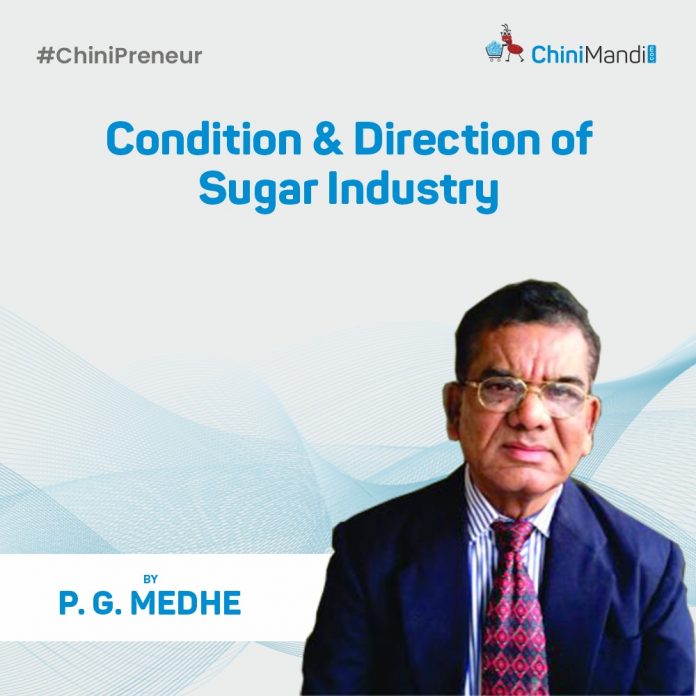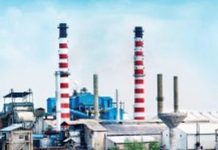The sugar industry has long been the backbone of Maharashtra’s agrarian economy, playing a pivotal role in rural development, employment generation, and socio-economic transformation. As one of the largest sugar-producing states in India, Maharashtra stands at a critical juncture, where the need for sustainable practices, technological advancement, and economic resilience is greater than ever.
“ Vision 2047” is a forward-looking initiative aimed at reimagining the future of Maharashtra’s sugar sector. It seeks to align the industry with global best practices while addressing region-specific challenges. This vision focuses on enhancing productivity through scientific sugarcane cultivation, promoting water-use efficiency via drip irrigation, encouraging mechanised and consolidated farming, and fostering the adoption of high-yield, climate-resilient cane varieties. It also places a strong emphasis on diversification through ethanol production, cogeneration, and bio-CNG, thus supporting the national agenda for energy security and sustainability.
Furthermore, this vision document underscores the importance of digital transformation and Artificial Intelligence (AI) in farming and processing, integrating precision agriculture and smart factory systems to boost efficiency and transparency. Simultaneously, it also examines the industry’s role in climate change mitigation and explores strategies for increasing exports, strengthening farmer cooperatives, and enhancing value addition.
“Vision 2047” is a roadmap not only for strengthening the sugar industry but also for ensuring inclusive growth and long-term viability of Maharashtra’s rural economy. It is a collective call for innovation, collaboration, and bold reforms that will shape a resilient and future-ready sugar ecosystem for the state.
PRESENT STATUS :
The sugar industry in Maharashtra is a pivotal component of the state’s agrarian economy, significantly contributing to employment and economic activity. As of the 2024-25 season, the industry has experienced notable fluctuations influenced by climatic conditions, policy decisions, and market dynamics.
Geographical Spread and Milling Infrastructure
Maharashtra’s sugarcane cultivation is predominantly concentrated in regions such as Kolhapur, Solapur, Pune, Nanded, and Ahmednagar. These areas host a substantial number of the state’s sugar mills. During the 2024-25 season, out of 211 Sugar mills, 200 sugar mills participated in crushing operations.
Crushing Capacity and Sugar Production:
The total crushing capacity of the State reached approximately 10 lakh MTs per day. Area under cane cultivation around the Maharashtra is 12 lakh Hectares. Total crushing ranges from 900 Lakh MTs to 1100 MTs depending upon natural conditions. Average Sugar recovery 10 to 11.5%.
During the current crushing season The cumulative sugarcane crushing reached 850 lakh tonnes, yielding 81.00 lakh tonnes of sugar. This reflects a decline from the previous season’s 106 lakh MTs produced during the same period. The overall sugar recovery rate approximately stood at 9.50 %, down from 10.16% in the prior season.
Ethanol Production and Co-generation
In response to evolving market conditions and policy incentives, Maharashtra’s sugar mills have increasingly diversified into ethanol production. By June 30, 2024, the state produced and supplied 580 million liters of ethanol. Additionally, many mills have engaged in co-generation activities, utilizing bagasse to produce electricity. However, reductions in power purchase rates from utilities have prompted mills to prioritize ethanol production over electricity co-generation.
Financial Health and Policy Challenges
Despite substantial production figures, the financial health of Maharashtra’s sugar industry faces challenges. The Minimum Selling Price (MSP) for sugar has remained at ₹31 per kg since 2019, while the Fair and Remunerative Price (FRP) for sugarcane has risen to ₹3,400 per tonne for the 2024-25 season. This disparity has led to mills incurring losses, as production costs surpass market prices. Furthermore, restrictions on ethanol production routes have reduced distillery operations, impacting revenue streams.
Weaknesses, Potentialities, and Threats
>Weaknesses:
Climatic Vulnerability: The industry is susceptible to weather anomalies, such as droughts and excessive rainfall, affecting cane yields and sugar production.
Financial Strain:Stagnant MSP amidst rising input costs has led to cash flow challenges for mills. Developing financial awareness like crop economics to the farmers time and again as the sugarcane is the only crop getting the price hiked every year.
Potentialities:
Ethanol Production: Expanding ethanol output aligns with national biofuel policies, offering an alternative revenue stream and reducing reliance on sugar sales.
Technological Advancements: Adopting modern and good agricultural practices and milling technologies will definitely enhance efficiency and yields.Selecting suitable varieties may be an additional advantage to the farmers.
Threats:
Market Volatility: Fluctuations in global sugar prices and export restrictions can impact profitability.Augmentation the Harvesting and Transport Labour in a gray’s area because of no perfect policy in place.
>Policy Constraints: Regulatory limitations on product diversification and pricing controls may hinder operational flexibility.
“Vision 2047: Strategic Recommendations”
To ensure the long-term sustainability and growth of Maharashtra’s sugar industry by 2047, the following strategies are recommended:
Policy Reforms: Advocate for periodic revisions of the MSP to reflect production costs and market realities, ensuring fair compensation for producers.
Diversification: Encourage mills to invest in ethanol production and other value-added products, reducing dependence on sugar revenues.
Infrastructure Investment: Enhance irrigation facilities and promote drought-resistant cane varieties to mitigate climatic impacts.
Financial Support: Establish financial mechanisms to assist mills during periods of low profitability, facilitating modernization and debt management.
Sustainability Initiatives: Implement environmentally friendly practices, such as waste-to-energy projects and efficient water management, to promote ecological balance.
Harvesting and Transport Labour Policy: A perfect and clear cut policy should be in place for H & T labour mobilisation, presently, which is on totally unorganised area.
By addressing current challenges and leveraging emerging opportunities, Maharashtra’s sugar industry can aspire to achieve a turnover of ₹2.5 lakh crore in the coming years, positioning itself as a global leader in the sector.
3) SUGARCANE DEVELOPMENT & TECHNOLOGICAL ADVANCEMENTS :
(2025–2047)
I) Enhancing Sugarcane Productivity and Sustainability
Adoption of High-Yielding & Climate-Resilient Varieties
Promote early-maturing, high-sucrose, and drought/flood-resistant cane varieties (e.g., Co-86032, VSI 12121, Co-15023).
Strengthen partnerships with institutions like VSI, ICAR, and State Agriculture
Universities.
Introduce localized varietal zoning based on soil and climate profiles.
Multi-Ratooning and Intercropping
Promote multi-ratooning techniques with proper crop management to improve land productivity and reduce input costs.
Encourage intercropping with pulses/oilseeds for income diversification and soil fertility.
II) Water-Efficient Farming
*100% Drip Irrigation by 2040
TIMELINES FOR IMPLEMENTATION IN A PHASED MANNER:
>70% coverage by 2030
>100% by 2040
Offer incentives/subsidies for micro-irrigation infrastructure, especially for small and marginal farmers.
Water Harvesting and Soil Moisture Management
Promote farm ponds, check dams, and in-situ moisture conservation techniques.
Encourage use of organic mulching and precision fertigation.
III) Mechanisation and Consolidated Farming Models
Mechanised Sugarcane Cultivation
Increase usage of: Sugarcane planters and harvesters Ratoon management devices GPS-guided tractors and drones for monitoring Promote Custom Hiring Centres (CHCs) for shared machinery access.
Consolidated and Cluster-Based Farming
Encourage land pooling/farming clusters for economies of scale.
Implement cooperative or FPO-led farming for input-output optimization.
IV) Digital & AI-Driven Sugarcane Management
Smart Crop Management
Use AI for:
Crop health prediction from drone and satellite images
Disease/pest prediction and preventive action
Irrigation scheduling based on real-time weather and soil data
Cane Area Survey & Yield Estimation
Deploy satellite imagery + AI for cane acreage mapping and yield forecasting.
Use GIS to digitize farm boundaries and link to farmer IDs.
V) AI and Automation in Sugar Mills
>Smart Process Control
Introduce AI for: Optimizing juice extraction and evaporation processes
Predictive maintenance of machineryMonitoring quality and efficiency in real time
Energy & Emission Monitoring
Use AI to reduce steam and power consumption
Real-time tracking of emissions, boiler efficiency, and ZLD compliance
VI) Capacity Building and Farmer Awareness
Establish “Smart Cane Farming Labs” in each sugar factory command area.
Thank Partner with agri-tech startups, universities, and NGOs to train farmers in:
Precision agriculture
AI tools for decision-making
Sustainable input usage
*Targets by 2047
*Parameter Target
*Drip Irrigation Coverage 100%
*Mechanisation Level >80%
*Yield (tons/ha) 120+
*Area under New Varieties 75%
*AI Integration (Field + Plant) 100%
*Water Use Efficiency +50% Improvement
4) DIVERSITY THE SUGAR ECONOMY: Beyond Sugar: Building a Bio-Energy & Agri-Industrial Hub.
The traditional sugar-centric model of the sugar industry must evolve into a broader bio-economy to ensure long-term sustainability, economic viability, and rural prosperity. Vision 2047 envisions the transformation of Maharashtra’s sugar sector into a diversified agri-industrial hub, with bio-energy, green chemicals, value-added agriculture, and integrated rural development at its core.
>Key Pillars of Diversification
Bio-Energy Expansion
~Ethanol Blending Programme (EBP): Align with India’s Ethanol Blending Roadmap (20% by 2025 and beyond) by adopting multi-feed distilleries using molasses, B-heavy, sugarcane juice, syrup, and grains.
~Compressed Biogas (CBG): Scale up CBG plants using spent wash, press mud, cane trash, and other biomass. Promote circular economy through bio-CNG for rural transport and power.
~Green Hydrogen Pilots: Explore hydrogen production using bagasse/biogas as a long-term strategy.
>Agri-Industrial Diversification
~Bio-based Chemicals & Materials: Invest in bio-plastics, organic acids, and bio-fertilizers derived from molasses, ethanol, and distillery byproducts.
~Co-Generation 2.0: Upgrade bagasse-based co-gen plants into smart bio-power units with grid flexibility and AI-enabled efficiency systems.
~Food Processing & Agri Hubs: Co-locate fruit processing, dairy units, rice mills, and maize processing near sugar complexes to create agri-value chains.
~Rural Industrial Clusters
Develop Rural Industrial Parks anchored around sugar factories with common infrastructure for MSMEs in food tech, biomass utilization, and logistics.
Promote skill development in agri-engineering, biotechnology, and renewable energy sectors.
~Sustainability & Carbon Market Participation
>Position the sugar industry as a net-zero sector by 2047 through:
Carbon credit generation (ethanol, CBG, co-gen).
Soil carbon enhancement via press mud compost.
Climate-smart agriculture with drip irrigation and AI-driven crop planning.
>”Vision 2047 Outcome”
Sugar factories will be multi-product, multi-feed, climate-resilient bio-refineries.
Farmers will benefit from diversified income sources and stable procurement models.
Rural Maharashtra will emerge as a green industrial engine supporting India’s energy security, food security, and climate commitments.
5) EMBRACE TECHNOLOGY & SMART FARMING: Digital Cane: Empowering Farmers with Tech:
To ensure long-term sustainability and competitiveness of Maharashtra’s sugar industry, it is imperative to embrace digital transformation in agriculture. The future of sugarcane farming lies in integrating technology with traditional practices to enhance productivity, optimize resource use, and empower farmers through data-driven decisions.
Key Focus Areas:
I) Digital Cane – Leveraging AI for Cane Cultivation
AI-based Crop Monitoring: Use of satellite imagery, drones, and AI algorithms for real-time crop health assessment, pest detection, and growth forecasting.
AI-Driven Advisory Systems: Personalised crop recommendations based on local weather, soil data, and crop stage through mobile applications.
Predictive Analytics: Forecasting cane yield, irrigation needs, and input requirements to optimise planning and reduce costs.
II) Consolidated & Mechanised Farming
Farm Aggregation Models: Promote cooperative and cluster farming models to consolidate fragmented land for efficient mechanisation.
Mechanised Operations: Encourage use of sugarcane planters, harvesters, and trash shredders to reduce labour dependency and enhance timeliness of operations.
Impact: Potential 20–25% increase in per hectare yield and 30–40% reduction in cultivation costs.
III) Promotion of Drip Irrigation & Smart Fertigation
Subsidized Drip Systems: Expand government-backed schemes for drip system installation across 100% of cane area by 2047.
Smart Fertigation: Integrate nutrient delivery with drip irrigation systems using sensor-based controllers and AI algorithms for optimal dosing.
Water Savings: Estimated 40–50% reduction in water use and significant fertilizer efficiency gains.
IV) Soil Health Monitoring & Regeneration
Soil Health Cards (SHCs): Universal SHC coverage with annual updates for all cane-growing plots.
Digital Soil Mapping: GIS-based mapping of soil fertility, moisture retention, and salinity levels to guide crop and fertilizer planning.
Carbon Sequestration Practices: Promote organic amendments and green manuring to enhance soil organic carbon and reverse degradation trends.
TARGRT OUTCOME BY 2047:
>40% increase in average cane productivity (tons/ha) through precision and consolidated farming.
>50% reduction in water usage per tonne of cane via smart irrigation systems.
>Digital empowerment of over 10 lakh farmers through AI-backed mobile platforms and advisory services.
“ Digital Cane” is not just a technological upgrade – it’s a revolution in how cane is grown, monitored, and managed. Maharashtra will lead this digital transformation in the sugarcane sector.
SWEETENING LIVELIHOODS: Farmer at the Core
“No sugar without the farmer – no future without fair value.”
The foundation of a resilient and prosperous sugar industry in Maharashtra lies in empowering the sugarcane farmer. Vision 2047 places the farmer at the heart of the value chain, ensuring sustainable incomes, dignity, and long-term viability of sugarcane cultivation through the following strategic interventions:
I) Assured Cane Price Mechanism
Implement a transparent, fair, and predictable cane pricing system, linked to real-time market trends and the value realization from ethanol and co-products.
Strengthen the FRP (Fair and Remunerative Price) model with state-level top-up incentives for sustainable practices (e.g., drip irrigation, low-GHG varieties).
II) Timely Payments through Policy and Digital Enforcement
Enforce strict timelines for cane payments using automated, real-time digital payment platforms monitored by the Sugar
Commissioner’s Office.
Integrate miller and farmer databases via blockchain or secured government portals to ensure direct benefit transfers (DBT).
III) Revenue Sharing Models with Millers
Institutionalise revenue-sharing frameworks where farmers share in the value from ethanol, power co-generation, CBG (compressed biogas), potash, and other value-added products.
Establish transparent profit-sharing agreements, benchmarked by cooperative and private mill best practices.
IV) Empowering Farmer Cooperatives and FPOs
Strengthen Farmer Producer Organizations (FPOs) and sugarcane cooperatives with training, AI tools, access to working capital, and marketing platforms.
Encourage joint ventures between millers and farmer groups for downstream products like bottled ethanol blends, bioplastics, or biofertilizers.
V) Policy Enablers for Farmer Security
Introduce a “Cane Income Security Scheme” ensuring minimum annual returns, even during price volatility.Link crop insurance schemes with real-time satellite and AI data to protect against yield loss due to climate change.
VI) Farmer-Centric Technology and Advisory
Deploy AI and IoT-based platforms for smart farming, pest alerts, and soil health monitoring.
Create district-level Cane Tech Cells to provide personalized guidance through mobile apps and on-ground extension teams.
7) POLICY INVESTMENT & INFRASTRUCTURE PUSH: Creating an Ecosystem (Vision 2047)
A robust and future-ready sugar and allied industry in Maharashtra will require sustained policy support, capital infusion, and integrated connectivity. By 2047, we envision a dynamic, technology-driven, multi-product ecosystem encompassing sugar, ethanol, power, biogas, CBG, and high-protein feed. To achieve this, the following long-term strategies are proposed:
I) Long-Term Policy Stability & Incentive Framework
>Ethanol & Multi-feed Distilleries
Policy Lock-in till 2047:
Ensure predictable policy environment with 20-year horizon for ethanol blending targets, with floor price guarantees and open-ended procurement by OMCs.
Multi-feed Licensing Flexibility:
Seamless switch between molasses, cane syrup, B/C-heavy and grain based feedstocks depending on crop dynamics and market demand.
Priority Land & Water Use Clearance:
Fast-track environmental & land-use approvals for ethanol and biogas infrastructure.
>Co-generation & Renewable Energy
Revise PPA Norms:
Long-term Power Purchase Agreements (PPAs) with viability-linked tariffs for co-gen & biomass-based power.
Grid Integration Subsidy:
Capex subsidy for co-gen facilities that modernise for grid synchronisation & export.
>Capital Support
Blended Finance Models:
Combine central/state incentives with low-interest loans (via NABARD, SIDBI) and viability gap funding.
Green Bonds & Carbon Credit Trading:
Enable distilleries to access international carbon markets via ethanol, bio-CNG and agri-residue usage.
II) Infrastructure Backbone: Connectivity & Integration
.>Ethanol Pipelines
Maharashtra Ethanol Grid (MEG):
Propose dedicated ethanol pipeline corridors connecting major production zones (Kolhapur, Ahmednagar, Pune, Solapur, Nanded) to blending depots and ports (JNPT, Mumbai Port).
This will reduce logistics cost by 30–40%, reduce turnaround time, and ensure year-round evacuation of ethanol like power evacuation to power plants.
>Grain Storage Infrastructure
Decentralised Grain Silos & Godowns:
Modern storage infrastructure near multi-feed distilleries for maize/rice with humidity control and real-time inventory tracking.
Integrate with National Food Security Mission (NFSM) and Warehousing Development and Regulatory Authority (WDRA) norms.
>Logistics & Cold Chain Hubs
Ethanol & Biochem Logistics Hubs:
Develop industrial hubs near major distillery clusters with:
Railway sidings, ethanol-compatible tankers
Bio-CNG packaging and dispatch facilities
Common testing, calibration, and quality assurance labs
Cold Chains for Diversification:
Support value-addition in cane juice, jaggery, and allied food products. Establish cold chains for:
Jaggery exports
Organic liquid sugar and nutraceuticals
Agri-biotech outputs like bio-stimulants
>Digital Infrastructure & Smart Ecosystem
AI-driven Feedstock Planning: Integrated database for sugarcane, grain, and syrup availability using satellite + GIS + AI forecasts.
Smart Plant Operations: Promote automation in distillery operations with Industry 4.0 tools, digital twins, and IoT-based real-time monitoring for water, energy, and emissions.
ENVIRONMENTAL SUSTAINABILITY: Green is the New Gold
Towards Net-Zero and Beyond
By 2047, Maharashtra’s sugar industry must be a model of industrial sustainability, climate responsibility, and circular economy. With increasing pressure on resources and climate resilience becoming a necessity, the sector must evolve beyond compliance into proactive green leadership.
>Carbon-Neutral Operations: Marching Towards Net-Zero
Carbon Footprint Auditing:
All sugar factories and distilleries to undertake third-party carbon footprint assessments by 2030, with reduction milestones every 5 years.
Carbon-Neutral Roadmap:
Transition plans for each unit to become carbon-neutral by 2047, including:
Biomass-based boilers with high efficiency.
Green hydrogen adoption pilot projects.
Transition from fossil fuels in transport and logistics to bio-CNG/electric vehicles.
Carbon Credits:
Promote trading of carbon credits by supporting farmers and factories that adopt regenerative agriculture and clean energy.
>Water to Energy:
Maximising the Blue-Green Nexus
Effluent to Biogas:
Scale up biomethanation of spent wash and effluents to generate clean energy and reduce methane emissions.
Bio-CNG Units:
Incentivise water-to-bio-CNG projects using vinasse and pressmud byproducts. A target of 200+ operational units by 2047.
Zero Liquid Discharge (ZLD):
Enforce ZLD in all distilleries; develop common effluent treatment zones for smaller cooperative units.
>Water Recycling & Aquifer Recharge
Condensate Recovery & Reuse:
Encourage use of condensate from distillation for cooling and process reuse.
Drip and Sprinkler Irrigation:
Scale up from current 18% coverage to over 70% of cane area by 2047.
Factory-Farmer Water Collaboration:
Establish ‘Water Banks’ and aquifer recharge pits across cane zones through factory CSR and government support.
>Biodiversity Preservation in Cane Zones
Agro-Ecological Buffer Zones:
Develop cane zone edges with native flora, bird sanctuaries, and pollinator strips.
Bio fencing & Cover Crops:
Promote biodiversity on bunds and intercropping with soil-repairing and pest-repelling species.
AI-based Monitoring:
Use drone and satellite data to monitor tree cover, biodiversity health, and green cover expansion year-wise.
>Green Certifications & Industry Recognition
Green Factory Ratings:
State-wide sustainability benchmarking and “Green Star Rating” program for sugar units.
Sustainable Sugarcane Labels:
Enable traceability from farm to bottle, allowing consumers to choose eco-certified ethanol or sugar products.
Modern Weigh Bridges :
Fly Ash Bricks:
CSR related initiative for sustainable agriculture income by increasing vertical growth in cane.
Targets by 2047
_Parameter 2025 Baseline 2047 Target
~Carbon-Neutral Units
<10 units 100% factories ~Water Recycling % (Process Use) 30% >85%
~Distilleries with Bio-CNG Units ~
20 >200
~Cane under Drip Irrigation
18% >70%
~Biodiversity Buffer Zones Pilot Stage
100% of cane zones
SKILL DEVELOPMENT & R&D– “Future-Ready Talent: Skilling for Tomorrow’s Mills”
To make the sugar and allied bioenergy sector globally competitive, it is imperative to invest in human capital and cutting-edge research. By 2047, the industry must evolve into a knowledge-driven, innovation-led ecosystem.
1. Skilling for Tomorrow’s Mills…
Launch comprehensive skill development programs tailored for:
Mill operators, technicians, and distillery workers.
Farm mechanisation specialists.
AI, automation, and IoT system managers.
Sustainability and carbon accounting experts.
Collaborate with National Skill Development Corporation (NSDC) and Maharashtra State Skill Development Society (MSSDS) to create certified, modular training curricula.
Establish Centre of Excellence (CoE) for hands-on training in:
Smart cane farming.
Fermentation and biofuel technologies.
Green hydrogen and CBG production.
2. SugarTech & BioEnergy Research Institutes…
Establish dedicated SugarTech Institutes in Maharashtra’s major sugar belts for:
Advanced cane breeding, gene editing, and stress-resilient varieties.
Sustainable agronomy and water-efficient farming (drip, fertigation).
Milling optimisation using AI and predictive maintenance.
Set up BioEnergy Research Institutes (BERI) focused on:
Ethanol yield enhancement technologies.
Multi-feedstock fermentation and distillation.
Carbon capture, green hydrogen, and CBG production.
Wastewater treatment and zero liquid discharge systems.
3. Innovation Hubs – Industry-Academia Collaborations…
Promote Innovation Hubs through Public-Private Partnerships (PPP) between:
Sugar mills, engineering firms, and biotech startups.
IITs, agricultural universities, and international research bodies.
Incentivise joint IP generation, patent filing, and pilot-scale projects.
Annual “Sugar Innovation Challenge” to fund and mentor disruptive ideas.
4. Roadmap to 2047…
Year Milestone Description –
2025 Baseline Skill Mapping Survey existing workforce skills, identify gaps.
2027 1st CoE Launched First Centre of Excellence operational in Western Maharashtra.
2030 2 Research Institutes SugarTech & BERI established and functional.
2035 5 Innovation Hubs Fully networked with industry clusters and universities.
2040 AI-Driven Mills 50% of mills adopt AI-assisted operations.
2047 Global Knowledge Hub to make Maharashtra to becomes global leader in sugar-bioenergy tech.
Online Sugar Marketing and Its Benefits…
Introduction
The traditional marketing system for sugar in India has largely remained manual and intermediated, leading to inefficiencies, reduced price realization for mills, and limited market reach. In alignment with the Digital India mission and the vision of a technologically advanced and self-reliant Maharashtra by 2047, the sugar industry must adopt online sugar marketing platforms to streamline trade, improve transparency, and optimize profitability.
What is Online Sugar Marketing?
Online sugar marketing refers to the digital sale and distribution of sugar via web-based platforms, B2B marketplaces, or mobile applications, enabling direct transactions between sugar mills and bulk buyers such as traders, food and beverage companies, pharmaceutical firms, and exporters.
Current Challenges in Traditional Marketing…
Dependence on middlemen or commission agents
Opaque pricing mechanisms
High logistical and transaction costs
Limited geographical outreach
Delayed payments and poor buyer tracking
Lack of demand forecasting and inventory optimization tools
Benefits of Online Sugar Marketing…
Benefit Area Description –
Market Transparency : Real-time pricing, buyer demand visibility, and transaction history
Wider Reach: Access to national and international buyers from a single platform
Higher Price Realisation:Elimination of intermediaries ensures better margins for mills
Efficient Logistics : Integration with e-logistics providers for faster and trackable deliveries
Ease of Transactions: Digital invoicing, payment gateways, and e-contracts reduce manual effort
Buyer Profiling & CRM: Helps mills assess buyer credibility and manage customer relationships better
Data -Driven Decision: Analytics on market trends, demand forecasting, and optimal pricing strategies
Environmental Benefits : Paperless transactions reduce administrative waste
Existing Models and Platforms –
Jaivik Kheti (for organic products) – shows potential for replication
eNAM (National Agricultural Market) – demonstrates successful digitization of agri-trade
Private platforms – Emerging B2B portals like TradeIndia, IndiaMART, and dedicated sugar-trade apps
Suggested Framework for Maharashtra –
To institutionalize online sugar marketing across all cooperative and private sugar mills in Maharashtra:
Phase I (2025–2027):
Pilot projects in 10 selected sugar mills
Development of a dedicated “MahaSugarMarket” portal and mobile app
Stakeholder training and digital literacy drives
Phase II (2027–2032):
Full-scale adoption by all 190+ sugar mills
Integration with GST, warehouse receipt systems, and transport logistics portals
Enabling linkages with banks and NBFCs for trade finance
Phase III (2032–2047):
Expansion to international markets through digital export facilitation
Blockchain-based transaction security
AI/ML-based predictive analytics for inventory, pricing, and demand
Policy Recommendations –
Mandate online sugar marketing adoption through cooperative bylaws
Provide financial and technical assistance to mills for digital transition
Collaborate with IT companies to develop a state-wide sugar trade platform
Introduce incentives for mills and traders using digital marketing systems
Conduct regular training programs under Sugar Technology Institutes
Expected Outcomes by 2047 –
100% digitization of sugar marketing in Maharashtra
20–25% increase in average price realization per tonne of sugar
30% reduction in time-to-market and payment cycles
Creation of a competitive, transparent, and efficient sugar trade ecosystem
Conclusion : Adoption of online sugar marketing is not just a technological upgrade—it is a transformative step towards making Maharashtra’s sugar industry globally competitive, economically sustainable, and digitally empowered by 2047.
GLOBAL COMPETITIVENESS…
Maharashtra to the World along with sustainability in agriculture & it’s practices: As we look toward 2047, the centenary of India’s independence, Maharashtra must set its sights firmly on the global stage. The sugar industry, long a cornerstone of rural prosperity in the state, must evolve from a predominantly domestic, commodity-driven model to a value-added, export-oriented, and globally competitive ecosystem.
Strategic Positioning in the Global Sugar and Ethanol Markets –
Maharashtra has the potential to become a key global player in both sugar and ethanol, following the lead of top producers such as Brazil and Thailand. To do so, a shift in mindset is essential—from volume to value, from production to precision, and from quantity to quality.
Key Strategic Objectives by 2047…
Export-Quality Sugar Production –
Set and enforce strict quality benchmarks aligned with international food safety and purity norms (e.g., ICUMSA standards). Create “Maharashtra Sugar” as a global brand, known for its purity, traceability, and ethical sourcing. Develop sugar export clusters with integrated infrastructure (quality testing labs, packaging, container yards).
Speciality Sugar Development –
Promote the production of organic sugar, brown sugar, low-GI sugar, and plantation white sugar for niche global markets.Facilitate certification processes (USDA Organic, EU Organic, Fair Trade) through a centralised support mechanism for cooperatives and private mills.
Collaborate with global buyers to co-develop premium sugar products tailored to consumer preferences in Europe, North America, and East Asia.
Global Ethanol Trade Participation –
Develop a framework for ethanol exports aligned with WTO norms and bilateral trade agreements.Position Maharashtra as a biofuel hub in the Indo-Pacific corridor by leveraging its coastal ports for export to South Asia, Africa, and Southeast Asia. Benchmark ethanol production costs and GHG savings with Brazil’s sugarcane-based ethanol and the US’s corn-based ethanol to ensure global competitiveness.
Benchmarking Against Global Leaders…
Brazil –
Strengths: Scale, mechanisation, ethanol blending, flexible production (sugar vs ethanol), R&D in cane varieties, Raton farming.
Benchmark Lessons: Develop flexible distilleries that can switch between ethanol and sugar production depending on market conditions. Increase mechanisation and adopt energy-efficient technologies in mills.
Thailand-
Strengths: Integrated agro-industrial model, focus on high-quality white and refined sugar, strong farmer-industry linkages.
Benchmark Lessons: Implement agro-industrial clustering and promote farmer cooperatives for direct benefit sharing. Invest in R&D for new varieties and disease resistance.
Actionable Benchmarking Goals for Maharashtra:
Metric: Brazil Thailand Maharashtra (Current)
Maharashtra 2047 Target
Cane Yield (T/Ha) 75-80 65-70 ~65 >85
Mechanisation (%) >85% ~70% <40% >90%
Ethanol Yield (litres/tonne cane) ~85 ~70 ~60 >90
ICUMSA Grade Target (Refined Sugar) <45 45-100 100-150 <45
C. Policy & Infrastructure Support
To achieve these ambitious targets, the following enablers are crucial:
I) mmExport Incentives & Trade Agreements:Collaborate with the Government of India to secure long-term trade agreements for sugar and ethanol exports.
II) Quality Control & Branding: Establish a “Maharashtra Sugar Quality Council” to oversee global standards compliance and branding initiatives.
III) Green Certification Infrastructure: Set up regional labs for organic and food safety certifications to ease export logistics.
IV) Skill Development & Training: Create specialized training programs in global trade compliance, organic certification, and export logistics for mill staff and farmers.
Vision 2047 – From Local to Global –
By 2047, Maharashtra’s sugar industry must not only feed the nation but also sweeten the world. With strategic transformation, smart benchmarking, and relentless focus on quality and innovation, the state can emerge as a global powerhouse of sustainable sugar , ethanol and by-products. “ Maharashtra to the World” must not remain a slogan—it must become a reality, driven by a future-ready, globally benchmarked sugar economy.
The “Vision 2027” for Maharashtra’s sugar industry presents a unified roadmap for sustainable, inclusive, and innovation-led growth. By harnessing the collective strength of both the cooperative and private sectors, the industry can achieve greater efficiency, diversification, and resilience. Cooperatives bring grassroots connectivity and social equity, while private enterprises drive innovation, technology adoption, and capital investment. Together—with government support in the form of progressive policies, infrastructure, and financial incentives—the industry can advance towards climate-smart agriculture, multi-feed distillation, and value-added by-product utilisation. With this collaborative approach, Maharashtra is poised to become a national leader in a modernised, farmer-centric, and globally competitive sugar economy along with sustainability in agriculture and its by-products.
P.G. Medhe is the former Managing Director of Shri Chhatrapati Rajaram Sahakari Sakhar Karkhana Ltd and sugar industry analyst. He can be contacted at +91 9822329898.












